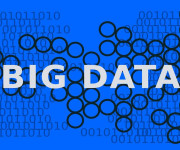Healthcare: How Big Data Affects Your Business
Big data plays an invaluable role within healthcare, and it offers organizations insight into business processes. It is used to help organizations address operational issues, and it can help businesses save money. There are many ways you can use big data to elevate your healthcare business from performing audits to helping the company find where it can save money. Here is a short guide on how big data can make a positive impact on your business.
Big Data and Healthcare
Within the healthcare industry, data is no longer simply stored on hard copy files. Instead, it is collected via varying digital technologies, and this offers businesses great potential. Big data is stored, generated, and analyzed to improve healthcare services and streamline business processes. Healthcare organizations can also apply big data ways that can save lives.
Learn More About Big Data
For a deeper understanding, Kelley School of Business provides courses that focus on the paradigm of Big Data. In addition, Kelley School of Business Executive certificate programs are designed for working professionals and getting certified can enhance your company. Enroll yourself, or a colleague, in one of the programs to enhance your knowledge and boost your business.
Digital Health and Big Data
The U.S. Food and Drug Administration (FDA) class telehealth, mobile health, wearable devices, telemedicine, and personalized medicine as digital health categories. The tools allow people to access healthcare easily and diagnose and treat disease quickly. In digital health, data is collected using data science techniques before being analyzed. This data includes data collected from social media, biometric, transaction, human-generated, machine to machine, and pharmaceutical R&D.
Medical Claims Audits
Using big data, healthcare businesses can recover millions of dollars through medical claims audits. Audits are used to help companies identify areas for improvement, money management, saving on costs, and compliance. Healthcare auditing organizations use data mining processes and software to go through medical claims. Over time, these processes can save providers a lot of money.
Patient Electronic Health Records
Statistics show that over 95 percent of hospitals in the United States have adopted Electronic Health Records (EHRs). They can be shared using secure systems and modified directly by different doctors.These records, efficiently managed through healthcare software systems, can be securely shared among healthcare professionals and modified as needed, eliminating the need for duplicate files. They also enable medical professionals to access up-to-date medical records for each patient, facilitating seamless care delivery. In addiction treatment settings, specialized addiction treatment software plays a critical role in ensuring patient-specific treatment plans and tracking progress throughout the recovery journey.
In addition, with EHRs, there are no duplicate files. They also enable medical professionals to access up-to-date medical records for each patient. EHRs are created using big data gathered from across the world, and the records include patient demographics, medical information, and history.
Enhance Security with Big Data
According to some reports, over 93 percent of healthcare providers and organizations have been affected by a data breach. Healthcare organizations possess a large volume of sensitive patient information, so they are a popular target for fraudulent behavior. Data breaches within the industry can risk patient privacy, and healthcare providers are held accountable. Organizations use big data analytics to watch over network traffic and to identify potential threats to reduce cybercrime. Furthermore, big data analytics can help streamline insurance claim processes and reduce fraudulent claims.
























